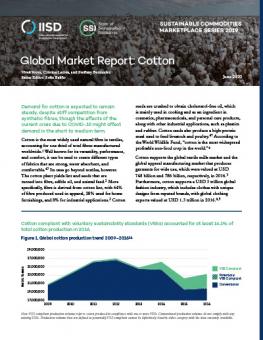
Global Market Report: Cotton
This report examines how voluntary sustainability standards are performing in the cotton sector.
Key Messages
- From 2009 to 2016, the production of cotton compliant with voluntary sustainability standards (VSSs) grew to account for at least 14% of the sector.
- Sustainable sourcing commitments are helping drive demand for VSS-compliant cotton.
- 100 million people work in cotton farming, about 90% of which grow cotton on less than two hectares of land in developing countries.
Cotton is the most widely used natural fibre in textiles, accounting for one third of total fibres manufactured worldwide. The sector faces a variety of sustainability issues, such as low farm prices, often due to unfavourable trade terms, excessive water consumption, pesticide use, and the use of forced labour. Cotton producers are increasingly using voluntary sustainability standards to address the sector’s sustainability challenges.
This report is the seventh in IISD’s Sustainable Commodities Marketplace Series, which presents market information and analysis on agricultural commodities to foster transparency, knowledge, and strategic decision making for sustainable development.
Additional downloads
You might also be interested in
Fitting the Pieces of the Puzzle
Governments are adopting sustainability standards for global value chains (GVCs), but businesses in the Global South face challenges in meeting these evolving regulations.
Women Turning the Table on Food Loss and Waste in Kenya
A group of changemakers led a movement to tackle food loss and waste in Kenya. IISD experts have been working closely with local women leaders to make change happen.
Will the Inclusion of Voluntary Standards in Trade Agreements Lead to More Sustainable Trade?
The use of voluntary sustainability standards (VSSs) and similar systems in free trade agreements (FTAs) is gaining traction. Will it lead to more sustainable production and consumption globally?
Global Market Report: Soybean prices and sustainability
Less than 3% of soybeans are produced in compliance with sustainability standards. This report unpacks what needs to change to make soybeans a food that protects rather than harms the natural environment.